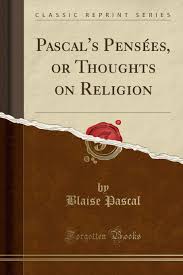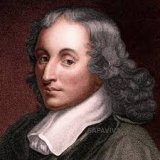Pensées Page #9
The Pensées is a collection of fragments on theology and philosophy written by 17th-century philosopher and mathematician Blaise Pascal. Pascal's religious conversion led him into a life of asceticism, and the Pensées was in many ways his life's work. The Pensées represented Pascal's defense of the Christian religion.
62 Preface to the first part.--To speak of those who have treated of the knowledge of self; of the divisions of Charron,[21] which sadden and weary us; of the confusion of Montaigne;[22] that he was quite aware of his want of method, and shunned it by jumping from subject to subject; that he sought to be fashionable. His foolish project of describing himself! And this not casually and against his maxims, since every one makes mistakes, but by his maxims themselves, and by first and chief design. For to say silly things by chance and weakness is a common misfortune; but to say them intentionally is intolerable, and to say such as that ... 63 Montaigne.--Montaigne's faults are great. Lewd words; this is bad, notwithstanding Mademoiselle de Gournay.[23] Credulous; people without eyes.[24] Ignorant; squaring the circle,[25] a greater world.[26] His opinions on suicide, on death.[27] He suggests an indifference about salvation, without fear and without repentance.[28] As his book was not written with a religious purpose, he was not bound to mention religion; but it is always our duty not to turn men from it. One can excuse his rather free and licentious opinions on some relations of life (730,231)[29]; but one cannot excuse his thoroughly pagan views on death, for a man must renounce piety altogether, if he does not at least wish to die like a Christian. Now, through the whole of his book his only conception of death is a cowardly and effeminate one. 64 It is not in Montaigne, but in myself, that I find all that I see in him. 65 What good there is in Montaigne can only have been acquired with difficulty. The evil that is in him, I mean apart from his morality, could have been corrected in a moment, if he had been informed that he made too much of trifles and spoke too much of himself. 66 One must know oneself. If this does not serve to discover truth, it at least serves as a rule of life, and there is nothing better. 67 The vanity of the sciences.--Physical science will not console me for the ignorance of morality in the time of affliction. But the science of ethics will always console me for the ignorance of the physical sciences. 68 Men are never taught to be gentlemen, and are taught everything else; and they never plume themselves so much on the rest of their knowledge as on knowing how to be gentlemen. They only plume themselves on knowing the one thing they do not know. 69 The infinites, the mean.--When we read too fast or too slowly, we understand nothing. 70 Nature ...--[Nature has set us so well in the centre, that if we change one side of the balance, we change the other also. I act. Τά � � α τρέχει. This makes me believe that the springs in our brain are so adjusted that he who touches one touches also its contrary.] 71 Too much and too little wine. Give him none, he cannot find truth; give him too much, the same. 72 Man's disproportion.--[This is where our innate knowledge leads us. If it be not true, there is no truth in man; and if it be true, he finds therein great cause for humiliation, being compelled to abase himself in one way or another. And since he cannot exist without this knowledge, I wish that, before entering on deeper researches into nature, he would consider her both seriously and at leisure, that he would reflect upon himself also, and knowing what proportion there is....] Let man then contemplate the whole of nature in her full and grand majesty, and turn his vision from the low objects which surround him. Let him gaze on that brilliant light, set like an eternal lamp to illumine the universe; let the earth appear to him a point in comparison with the vast circle described by the sun; and let him wonder at the fact that this vast circle is itself but a very fine point in comparison with that described by the stars in their revolution round the firmament. But if our view be arrested there, let our imagination pass beyond; it will sooner exhaust the power of conception than nature that of supplying material for conception. The whole visible world is only an imperceptible atom in the ample bosom of nature. No idea approaches it. We may enlarge our conceptions beyond all imaginable space; we only produce atoms in comparison with the reality of things. It is an infinite sphere, the centre of which is everywhere, the circumference nowhere.[30] In short it is the greatest sensible mark of the almighty power of God, that imagination loses itself in that thought. Returning to himself, let man consider what he is in comparison with all existence; let him regard himself as lost in this remote corner of nature; and from the little cell in which he finds himself lodged, I mean the universe, let him estimate at their true value the earth, kingdoms, cities, and himself. What is a man in the Infinite? But to show him another prodigy equally astonishing, let him examine the most delicate things he knows. Let a mite be given him, with its minute body and parts incomparably more minute, limbs with their joints, veins in the limbs, blood in the veins, humours in the blood, drops in the humours, vapours in the drops. Dividing these last things again, let him exhaust his powers of conception, and let the last object at which he can arrive be now that of our discourse. Perhaps he will think that here is the smallest point in nature. I will let him see therein a new abyss. I will paint for him not only the visible universe, but all that he can conceive of nature's immensity in the womb of this abridged atom. Let him see therein an infinity of universes, each of which has its firmament, its planets, its earth, in the same proportion as in the visible world; in each earth animals, and in the last mites, in which he will find again all that the first had, finding still in these others the same thing without end and without cessation. Let him lose himself in wonders as amazing in their littleness as the others in their vastness. For who will not be astounded at the fact that our body, which a little while ago was imperceptible in the universe, itself imperceptible in the bosom of the whole, is now a colossus, a world, or rather a whole, in respect of the nothingness which we cannot reach? He who regards himself in this light will be afraid of himself, and observing himself sustained in the body given him by nature between those two abysses of the Infinite and Nothing, will tremble at the sight of these marvels; and I think that, as his curiosity changes into admiration, he will be more disposed to contemplate them in silence than to examine them with presumption. For in fact what is man in nature? A Nothing in comparison with the Infinite, an All in comparison with the Nothing, a mean between nothing and everything. Since he is infinitely removed from comprehending the extremes, the end of things and their beginning are hopelessly hidden from him in an impenetrable secret, he is equally incapable of seeing the Nothing from which he was made, and the Infinite in which he is swallowed up.
Translation
Translate and read this book in other languages:
Select another language:
- - Select -
- 简体中文 (Chinese - Simplified)
- 繁體中文 (Chinese - Traditional)
- Español (Spanish)
- Esperanto (Esperanto)
- 日本語 (Japanese)
- Português (Portuguese)
- Deutsch (German)
- العربية (Arabic)
- Français (French)
- Русский (Russian)
- ಕನ್ನಡ (Kannada)
- 한국어 (Korean)
- עברית (Hebrew)
- Gaeilge (Irish)
- Українська (Ukrainian)
- اردو (Urdu)
- Magyar (Hungarian)
- मानक हिन्दी (Hindi)
- Indonesia (Indonesian)
- Italiano (Italian)
- தமிழ் (Tamil)
- Türkçe (Turkish)
- తెలుగు (Telugu)
- ภาษาไทย (Thai)
- Tiếng Việt (Vietnamese)
- Čeština (Czech)
- Polski (Polish)
- Bahasa Indonesia (Indonesian)
- Românește (Romanian)
- Nederlands (Dutch)
- Ελληνικά (Greek)
- Latinum (Latin)
- Svenska (Swedish)
- Dansk (Danish)
- Suomi (Finnish)
- فارسی (Persian)
- ייִדיש (Yiddish)
- հայերեն (Armenian)
- Norsk (Norwegian)
- English (English)
Citation
Use the citation below to add this book to your bibliography:
Style:MLAChicagoAPA
"Pensées Books." Literature.com. STANDS4 LLC, 2024. Web. 25 Nov. 2024. <https://www.literature.com/book/pens%C3%A9es_114>.




Discuss this Pensées book with the community:
Report Comment
We're doing our best to make sure our content is useful, accurate and safe.
If by any chance you spot an inappropriate comment while navigating through our website please use this form to let us know, and we'll take care of it shortly.
Attachment
You need to be logged in to favorite.
Log In